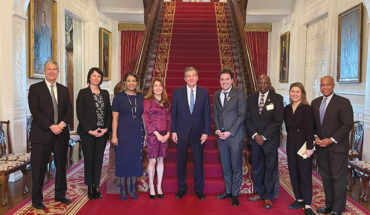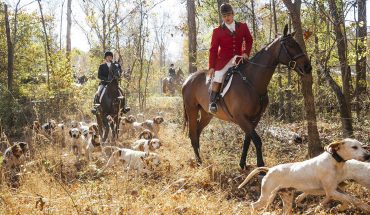photographs by Jimmy Williams and Chris Seward
Can a successful coach be nice?
Intense, severe, strong: yes. But nice?
Consider Carolina Hurricanes head coach Kirk Muller. Standing tall and trim in a suit behind the bench at PNC Arena on game night, he projects cool and confidence. An injured starter, a junk goal, a dumb penalty – the composure-rattling stuff of a game in full throttle – might make Muller purse his lips, confer with an assistant, move on. He leaves the histrionics to the folks on the other side of the Plexiglass.
Muller came to Raleigh to coach the Hurricanes in the middle of last season, when the team had dug itself a hole with early losses and no longer seemed motivated to climb out. He succeeded Paul Maurice, who had coached the team twice. The Hurricanes had some talent, but lacked a clear identity.
With Muller came clarity and a new perspective, that of an experienced player, one who has worn those skates. He’s done it all, first on the ice, then off. His 19-season hockey odyssey took him to the edge of hall-of-fame contention: A second-overall draft choice in 1984 (No. 1? Fellow named Mario Lemieux), “Captain Kirk” was a favorite in New Jersey. Then he not only ended up captain again when he was traded to Montreal, but scored the Stanley Cup-winning goal in 1993. Six-time all-star. Bounced around a bit, and ended up on a line called the “Grumpy Old Men” in Dallas, playing with old friend John
MacLean from his early New Jersey years, and enjoying a final for-old-times’-sake run to the Cup finals.
“That’s how you become a coach,” says MacLean, who was Muller’s first hire here as an assistant. “Start out as a rookie, find a way to survive,” when you’re young and strong. “Then kids come along, they’re a little faster; you go to the third line,” ending up as a bit player. “From star to checker to support cast to cheerleading,” MacLean says. “He’s done it all.”
All of that has contributed to the energy, focus, and upbeat approach that shape his approach to coaching. “I’m really honest with them,” Muller says of his players. “Go out there and work hard and have fun. I believe defense wins, and I believe in being aggressive. Communicate, and really get to know your players. So if you apply that as a culture, come every day to play…,” he shrugs. “I think I want to coach the way I felt as a player. You gotta have enthusiasm and have to enjoy what you’re doing.”
His upbeat reputation “is why I really went after him as our coach,” says Hurricanes general manager Jim Rutherford. “I’m not sure we could have picked a better guy. He’s that down-to-earth guy that everybody can relate to, and that’s good for the team and good for the fans and good for the Hurricanes.”
Muller’s hard-earned experience gives him the kind of clout with the players that doesn’t come any other way. And it helped smooth over the inevitable indigestion of his early days last season, when he began to install the up-tempo, aggressive game he favors. The second half of last season reflected the man in charge: cohesive, focused, fast.
Muller’s plans for this season were interrupted by the lockout and contract dispute that delayed the start until January. The season began with two ugly losses, and fans began to hyperventilate. But Muller, having played and coached in the hockey hotbed of Montreal, helped the team maintain its focus and soon had the Hurricanes playing the spirited hockey that fans love. Now the Hurricanes seem headed to their first playoff appearance since 2009.
When Muller got the call from Rutherford, he wasn’t sure where he was headed, exactly. “I guess I never really thought of Raleigh as a town,” he says with a disarming grin in the manicured yard of his North Raleigh home. Fit at an even six feet, a full head of thick hair at 46, he jokes about how he “lost my bottom teeth when I was in Czechoslovakia,” yet manages to cracks a smile of sufficient wattage to break every sign ordinance in Cary.
“Everyone thinks of the state, and the area, and what it’s all about,” he says, but what was Raleigh? “You come in as a visiting player or a coach, and a lot of guys say, ‘Where is it?’”
“Except for Sullivan’s,” he laughs, he wasn’t sure Raleigh had a “there.” (The Glenwood South steakhouse is a favorite of visiting hockey teams.)
In any case, Raleigh was a secondary consideration. “You make your hockey decision first,” Muller says. And that was easy: A team with Cam Ward keeping pucks out of the goal, and Eric Staal and Jeff Skinner putting them in obviously had a strong core. “So I looked at it that way right off the hop, and said there’s something here.” Muller liked general manager Jim Rutherford and owner Peter Karmanos, both of whom have good reputations in the league.
But then Muller had to consider whether it made sense to bring his wife and two of his four daughters to a city that for all he knew didn’t have much more to recommend it than Sullivan’s. A wife and daughters who have moved with him through a career that started in his hometown of Kingston, Ontario, and has led everywhere from Toronto to Dallas, Florida to New Jersey, New York to Montreal. “This is the part people forget in the sports world,” Muller says. “You’re just people, as well.”
And before the five-month stint as head coach (of the minor-league Milwaukee Admirals) that immediately preceded his call to Raleigh, Muller had spent five years as an assistant in the city where he’d had his greatest success. “I was coming from Montreal, a busy, multicultural type of place, lots going on.”
And then: Raleigh, about which Muller now sounds a bit like a Chamber of Commerce ad: “It’s a good place to raise kids, got a good pace of life.” Close to Hilton Head and Pinehurst and the beach. “The weather’s great, the people are friendly. It’s like a pretty darn good state.”
He complains of being confused by all those beltlines (“In hindsight I would’ve studied the map a little more”), but he’s happy – as is his family. His older girls are in college in Canada, and one daughter is still in high school. The other, amid offers from Texas and Georgia, chose N.C. State. “She told me this is her favorite place she’s lived.” So on that score, Raleigh’s working out just fine.
In some ways, coaching a hockey team is like any other management job. There are the Karmanoses and Rutherfords at the top, making decisions, setting policy, spending money for players. And then there are the players, guys with individual capacities and needs and salaries, each his own management puzzle. Between them, there’s Muller, trying to cajole and challenge his charges, to satisfy and reassure his bosses. He’s a man in the middle.
Muller is unusually well-suited to the role: His 20 years in the league taught him how to win championships, and how to stay in the game when his skills were slipping. He’s a guy who found himself in a bad spot once or twice, professionally, and didn’t know quite how to handle it, and can give you the benefit of that experience.
On Muller’s team, players earn their ice time and play hard to keep it.
“That’s when [experience is] kinda nice,” he says when asked about how he handled sitting veteran defenseman Joe Corvo early this season when his play slipped. “I was a healthy scratch a couple times in Dallas. The players are men. They’re not always happy to hear it, but they love to have the information back.” And when he was in Corvo’s skates, “I was fine – I just wanted the truth.”
“He knows how players feel,” says forward Jussi Jokinen. “First line, second line, third line. He’s not afraid to sit veteran guys. That’s a lot of motivation. Nobody wants to sit games.”
Knowing how players feel is no small thing. Muller received special praise for freeing captain Eric Staal and goalie Cam Ward from self-imposed pressures that seemed to be draining their enthusiasm for the game. As stars on the 2006 Stanley Cup championship team when they were very young players, the two have sometimes seemed to struggle under the expectation that they were to blame if the team didn’t succeed.
“Look at his career,” Muller says of Staal, 28. “You walk in and you win the cup, surrounded by all these top players. [Back then], he just had to play. Then he steps into a role of captain. They feel like they have to be Superman.” Staal was the second-overall draft pick in the 2003 NHL draft, almost exactly 20 years after Muller had the same experience; Muller was a forward like Staal.
So Muller went back to basics with his captain. “I said: All I’m asking is if you’re my hardest-working player,” he recalls. “You’re the face of this team. Your body language is gonna be huge. Just get out there and play hard and have fun.” Broadcaster John Forslund characterizes the exchange: “That’s the first thing he told Staal: ‘Relax mentally. I don’t care if you score another goal, as long as you’re my hardest worker.’ He let him relax, and his season took off.”
Muller says the credit goes to Staal, but whoever gets the credit, “I think from Christmas on (last season), he was one of the top three forwards” in the league. This year has brought more of the same: Staal is on the fastest scoring pace of his career.
In the locker room after a recent practice, Staal smiles. He doesn’t recall anybody telling him it was fine if he stopped scoring. “It was more along the lines of – if you do the right things, play the right way, that takes care of itself,” Staal said. “I think he really brought some of that. His energy and his attitude has rubbed off on us, and that’s what you want.”
 Muller’s halo does have its limits. Told that he’s been rumored to eschew F-bombs – four daughters, a family man, and all that – Muller breaks into a wide smile. “Oh, I don’t know,” he says, then laughs. “The players might say different. I can turn it on.” Players, asked the same question, show the same smile and give the same answer. Muller isn’t shy about bringing the noise when the time comes. “But I’m pretty good with the public.”
Muller’s halo does have its limits. Told that he’s been rumored to eschew F-bombs – four daughters, a family man, and all that – Muller breaks into a wide smile. “Oh, I don’t know,” he says, then laughs. “The players might say different. I can turn it on.” Players, asked the same question, show the same smile and give the same answer. Muller isn’t shy about bringing the noise when the time comes. “But I’m pretty good with the public.”
All of this makes Muller easy to root for: He’s real; a good guy. Knows how to keep everyone happy on the ice and in the office, and his family happy, too; he’s quick with a laugh, likes a golf game with the boys. “It’s kind of the Canadian aspect of it,” MacLean says of Muller. “Respect the game and treat people right.”






